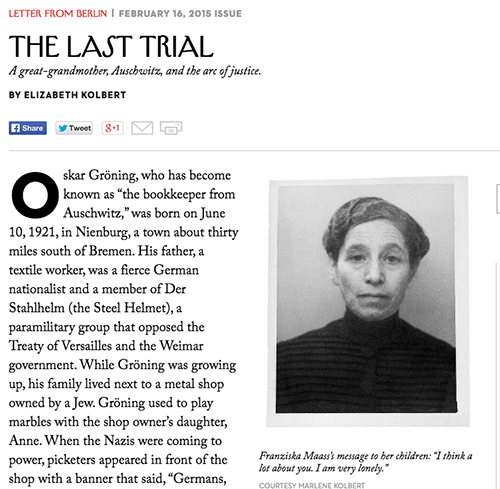—Frank Tuerkheimer and Michael Bazyler
 Elizabeth Kolbert’s article in the February 16th issue of The New Yorker, “The Last Trial” is a wonderful summary of the belated and long overdue reaction of the German legal system to the atrocities committed by the Germans in implementing the plan to exterminate European Jewry. She correctly notes that with the Demjanjuk decision, the German legal establishment has now reached a final stage in its legal approach to Nazi criminality: anyone participating in the operation of a death camp is legally complicit in homicide, requiring no specific proof that the person killed or injured anyone.
Elizabeth Kolbert’s article in the February 16th issue of The New Yorker, “The Last Trial” is a wonderful summary of the belated and long overdue reaction of the German legal system to the atrocities committed by the Germans in implementing the plan to exterminate European Jewry. She correctly notes that with the Demjanjuk decision, the German legal establishment has now reached a final stage in its legal approach to Nazi criminality: anyone participating in the operation of a death camp is legally complicit in homicide, requiring no specific proof that the person killed or injured anyone.
This is not the first time such an approach has been taken to Second World War crimes committed by the Germans. When the U.S. War Department was preparing for the main Nuremberg trial before the International Military Tribunal in 1945, Colonel Murray Bernays brilliantly came up with a similar idea, eventually implemented in the Nuremberg Charter. The Bernays plan contemplated Nazi bodies to be charged as criminal organizations. If convicted, then in the future it would only be necessary to prove that an accused Nazi was a member of that organization; the degree of individual involvement would bear on the sentence meted out to the convicted member. The Allies charged and the International Military Tribunal in its 1946 judgment convicted the SS [Schutzstaffel, the Nazi party’s protection squad], the SD [Sicherheitsdienst, the Nazi’s security service] and the Gestapo as criminal organizations, adding the requirement that in a subsequent prosecution under the Bernays theory the prosecution would have to prove that the person was aware of the organization’s criminal activity – a relatively soft burden when it came to concentration camp administrators.
Bernays’ idea was implemented in subsequent Nuremberg trials conducted by the U.S. military, but never after that. Thus the envisioned extensive prosecution of the large number of persons complicit in German atrocities never took place. While the Germans did prosecute several cases involving the death camps – Treblinka, Sobibor, Chelmno, Belzec and Auschwitz – they applied the technical requirements of the German penal code, which required specific motivation for the crime of homicide to have occurred. This cramped the prosecutions significantly and resulted in many acquittals and very light sentences.
Now, seventy years after the Bernays’ vision of future prosecutions, the German legal system has adopted a similar approach. Seventy years, however, is a lethal gap, and it is unlikely that any still-living geriatric Nazi war criminals will be prosecuted to completion. Already, a number of Auschwitz guards have died while awaiting prosecution. Demjanjuk died in an old-age home while awaiting an appeal of his relatively light six-year sentence.
Ephraim Zuroff, the Simon Wiesenthal Center’s chief Nazi hunter, has quipped that he is the only Jew in the world who prays for the good health of Nazi war criminals. Given the passage of time, it is doubtful that his prayers will be answered.
Laudatory as the new German approach is, it is painful to think of all the Demjanjuks in the administration of the death camps who either were not prosecuted or who received light sentences. Kolbert’s reference to Martin Luther King’s lament that justice may come too late is apt and sobering.
Frank Tuerkheimer is Professor of Law Emeritus at the University of Wisconsin School of Law. Michael Bazyler is Professor of Law and the 1939 Society Scholar in Holocaust and Human Rights Studies at the Dale E. Fowler School of Law, Chapman University. They are co-authors of Forgotten Trials of the Holocaust (NYU Press 2014).
